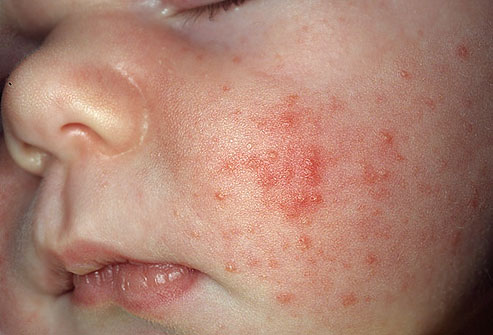Infant eczema is very common between 2 to 6 months of age. This is usually very nasty and itchy and be very uncomfortable to your child since it may start on the scalp then on the cheeks and spread on neck, legs and arms.
What is Infant Eczema?
Infant eczema is a skin rash that may appear in your child’s first couple of months. It may appear in forehead, face, elbows, arms and legs. The skin of an infant with eczema may appear very dry and may be very sensitive. Most cases of infant eczema are outgrown by the time the child reaches three years old. However, some chronic cases of infant eczema may result to adult eczema later on.
Generally, infant eczema is not allergic reaction but allergies can trigger and worsen the appearance of infant eczema. If an allergic reaction causes or worsen the eczema, the doctor may modify your child’s diet to lessen the risk of infant eczema.
What are the Causes of Infant Eczema?
The exact cause of infant eczema is not really known but genetics plays a major role in developing the disease. If one or both parents had history of eczema, a child had high risk of having the infant eczema later on. Likewise, if a close relative have asthma and allergies, the infant may also exhibit symptoms of infant eczema.
Though the rashes that appear in infant eczema are not cause by any allergies, it can still trigger the severity of redness and itchiness. Any allergen found in your baby’s diet or to the mother’s diet if breastfeeding may worsen, when that happens, your health care provider will modify your diet.
Other factors that may cause infant eczema may also include:
- Dog or cat dander
- Rubbing the affected skin
- Excessive sweat
- Too much heat
- Body soap
- Smoking
- Harsh detergents and soaps
- Food allergies like egg whites, cow’s milk, nuts and chocolate
What are the Symptoms of Infant Eczema?
The symptoms of infant eczema may also appear the same way as eczema in adult. Some of the symptoms of infant eczema are:
- Blisters that may appear first in scalp, then, at the forehead. And may spread to other parts of the body like neck and arms.
- The skin of baby with infant eczema may also appear dull and very dry.
- The skin may also feel warm when it is touched.
The symptoms of infant eczema may vary from one patient to another. If allergies worsen the condition of your child, you may have a food diary and list there the possible food triggers of infant eczema.
What are the treatments to Infant Eczema?
Treatments to infant eczema may vary from one child to another as well as the risks of reoccurring may differ from medical history of the parents. If one or both parents have eczema, there is a risk that an infant is prone to develop eczema. Likewise, your physician may require diet and lifestyle modification to treat symptoms of infant eczema.
Treatments to infant eczema may include:
1. Topical corticosteroid
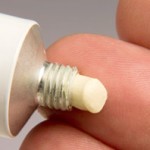 Topical corticosteroid is given to infants especially if the eczema keeps reoccurring. This is effective in lessening or stopping a vicious cycle of rashes. Ideally, the safest corticosteroid to use is the mildest form, unless the doctor prescribed a stronger cream. However, do not over extend the use of topical corticosteroid as it may also cause rebound. Follow the instructions of the doctor as to avoid worsening the symptoms and irritation.
Topical corticosteroid is given to infants especially if the eczema keeps reoccurring. This is effective in lessening or stopping a vicious cycle of rashes. Ideally, the safest corticosteroid to use is the mildest form, unless the doctor prescribed a stronger cream. However, do not over extend the use of topical corticosteroid as it may also cause rebound. Follow the instructions of the doctor as to avoid worsening the symptoms and irritation.
2. Petroleum jelly
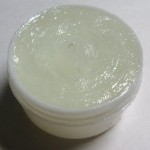 Avoid excessive skin dryness, as this will worsen the condition. It is recommended that you put petroleum jelly to moisturize the infected area.
Avoid excessive skin dryness, as this will worsen the condition. It is recommended that you put petroleum jelly to moisturize the infected area.
Â
           3. Lukewarm bath
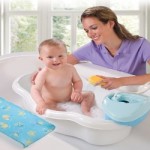 Part of treating infant eczema is carefully bathing your child. Doctors recommend that a child with eczema should be bathed in lukewarm bath for at least twice a day. Lukewarm bath with unscented soap is needed in order to retain the proper moisture of the skin.
Part of treating infant eczema is carefully bathing your child. Doctors recommend that a child with eczema should be bathed in lukewarm bath for at least twice a day. Lukewarm bath with unscented soap is needed in order to retain the proper moisture of the skin.
4. Wear cotton dress
 A child with infant eczema should wear cotton dress, as this is less restrictive and not irritating to the skin. Avoid any wool dress or any harsh material as this might worsen the symptoms of infant eczema.
A child with infant eczema should wear cotton dress, as this is less restrictive and not irritating to the skin. Avoid any wool dress or any harsh material as this might worsen the symptoms of infant eczema.
5. Vitamin E healing lotion
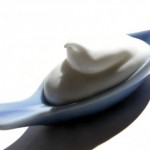 Another effective treatment is vitamin E healing lotion. They can heal the skin much faster and can aid in moisturizing the skin.
Another effective treatment is vitamin E healing lotion. They can heal the skin much faster and can aid in moisturizing the skin.
           6. Humidifier
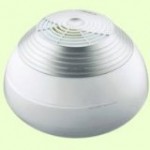 Sudden temperature may trigger or worsen your child’s condition. Aim for a normal room temperature, it is recommended that you have humidifier at your child’s bedroom and play area to prevent excessive dryness of the skin.
Sudden temperature may trigger or worsen your child’s condition. Aim for a normal room temperature, it is recommended that you have humidifier at your child’s bedroom and play area to prevent excessive dryness of the skin.
Infant eczema may reoccur if there is a previous history but these can be prevented and manage if you will coordinate with your child’s pediatrician.
